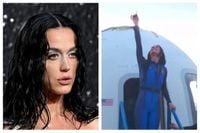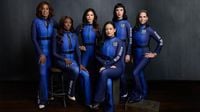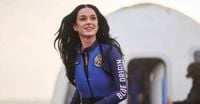In a move that has ignited fierce debate and criticism, pop star Katy Perry, along with a group of prominent women, embarked on a historic all-female space mission aboard Blue Origin's New Shepard rocket. The journey, which took place on April 14, 2025, lasted just 11 minutes and has since prompted a backlash regarding the implications of such a trip amidst pressing global issues.
The mission, known as NS-31, included notable figures such as CBS host Gayle King, aerospace engineer Aisha Bowe, civil rights activist Amanda Nguyen, film producer Kerianne Flynn, and Lauren Sánchez, who is also Jeff Bezos' fiancée. This flight marked the first all-female crew to visit space since Soviet cosmonaut Valentina Tereshkova's solo flight in 1963.
Upon returning to Earth, Perry was seen kissing the ground — a gesture that many perceived as an "ultimate insult" to NASA astronauts who have faced much more challenging conditions in space. Critics quickly took to social media to express their outrage, suggesting that Perry's actions trivialized the sacrifices of astronauts like Sunita Williams and Butch Wilmore, who were stranded aboard the International Space Station for nine months due to a capsule malfunction.
Among the critics was actress Olivia Munn, who stated on the Today show, "There are so many other things that are so important in the world right now. What’s the point? Is it historic that you guys are going on a ride? I think it’s a bit gluttonous.” This sentiment resonated with many, particularly given the exorbitant costs associated with space tourism, which is reported to require a deposit of around $150,000.
In response to the backlash, Jessica Alba defended the mission on Instagram, urging her followers to redirect their anger towards political figures, specifically mentioning former President Trump. Alba reposted a message from political strategist Ana Navarro-Cárdenas, stating, "I wish people would show the same energy & focus that anger towards fearlessly denouncing Trump’s abuses of power, which do affect countless lives in the US and the world."
Despite the criticisms, the crew members defended their flight, emphasizing its significance for women and girls. Gayle King remarked, "There was nothing frivolous about what we did," and highlighted the mission's potential to inspire future generations. Bowe added, "We advanced science today... We are inspiring the world right now." The mission was not just a joyride; it also aimed to gather scientific data that could contribute to future research.
The flight's brief duration has raised questions about what constitutes a legitimate space mission. While the New Shepard spacecraft reached an altitude of 62 miles, surpassing the Kármán line — the internationally recognized boundary of space — the debate continues about whether such short trips can be classified as genuine space exploration.
Social media reactions were swift and often scathing. Wendy's, known for its sharp online presence, tweeted, "Can we send her back?" in reference to Perry's post-flight antics. The fast-food chain's comments, along with those from other celebrities, highlighted the growing sentiment that such missions are out of touch with the realities faced by everyday people.
Moreover, the environmental implications of space tourism have not gone unnoticed. Critics argue that the resources expended on such flights could be better utilized to address pressing issues on Earth, especially as many Americans struggle with rising living costs. Emily Ratajkowski condemned the mission, calling it "end-time s**t" and questioning the environmental ethics of flying into space while claiming to care for Mother Earth.
Perry, however, seemed unfazed by the criticism. After the flight, she shared a post on Instagram featuring her daughter Daisy's lunchbox, stating, "Back to the best reality, packing school lunch," suggesting a return to normalcy after her brief foray into space.
The mission's aftermath has sparked a larger conversation about the nature of celebrity involvement in space exploration and whether such endeavors genuinely contribute to scientific knowledge or simply serve as publicity stunts for the wealthy. As the space tourism industry continues to grow, estimated to be worth $1.3 billion in 2024, the implications of these missions will likely remain a topic of heated debate.
In the end, while the NS-31 mission may have achieved a historic milestone in terms of an all-female crew, it has also drawn attention to the stark contrasts between the experiences of celebrities and those of professional astronauts dedicated to advancing human knowledge in space. The question remains: what does it mean to truly explore space, and who gets to do it?









